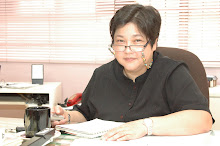(Statement of the Director of the UP Center for Women's Studies, on the plagiarism issue against Prof. Marvic Leonen, Dean UP College of Law)
December 9, 2010
News reports dated December 8, 2010 announced the offer of resignation of Dean Marvic Leonen of the UP College of Law on his admission that he had inadvertently left out two footnotes that contain the source attributions in his 2004 article titled "Weaving Worldviews: Implications of Constitutional Challenges to the Indigenous Peoples Rights Act of 1997."
"I had made that mistake. It's an honest mistake but one I should acknowledge, apologize for, and basically meet the penalty. And I thought that a huge part of it would be to offer to resign the deanship," Leonen is reported to have said.
In so doing, Dean Leonen has taken the first step towards showing our people what integrity means for lawyers, whether as professors of law or as officers of the court. In so doing, Dean Leonen honors his commitment to the restoration of the integrity of the law profession and the Philippine courts which is the subject of a statement of the faculty of the UP College of Law (UPCL) on the allegations of plagiarism and misrepresentation in the Supreme Court.
Many sectors of the UP Community, including the UP Center for Women's Studies, supported the statement of the UPCL on that matter. I call on our leadership and my colleagues to stand fast in our support and to build on Dean Leonen's example. Let us show our people and the Supreme Court how to honorably handle a case of alleged wrongdoing on the part of one of our colleagues.
First, let us look clearly at the facts. One fact that is important in both cases is the opinion of the person or persons who were plagiarized. In the case of Dean Leonen, Prof. Owen Lynch has already stated that he does not feel that he was the victim of intellectual dishonesty. This is in marked contrast to the statements of those authors plagiarized by in the Vinuya v Executve Secretary decision.
This makes Dean Leonen's offer to resign an act of integrity. That he does not equivocate about admitting his plagiarism despite it being an “honest mistake,” makes it even more laudable. This contrasts sharply with the actions of Justice del Castillo who ignored calls for his resignation and the finding of the Supreme Court that “malicious intent” is required in plagiarism.
Teachers know that there are degrees and degrees of plagiarism and misrepresentation. Without excusing Dean Leonen who does not himself seek to be coddled by colleagues, it is my belief that there is a marked difference between the level of the misrepresentation in “Vinuya v. Executive Secretary” and in “Weaving Worldviews.”
I suggest to the UP leadership that if it be necessary, any body formed to judge the issue of Dean Leonen's plagiarism, be composed of peers who have no personal interests in seeing him absolved or punished.
Dean Leonen has shown us that public accountability does not lie in not making mistakes, but in owning up to them and being ready to face the consequences. Those of us in UP who have supported the faculty of the College of Law in their efforts to restore integrity to government service should take this as an opportunity to show our people that collegiality and compassion are never incompatible with the demands of justice.
If it should be shown that those who revealed this “new” case of plagiarism are motivated by reasons other than truth-telling, then they have made a serious error in judgment. With his offer to resign, Dean Leonen has proven, yet again, his moral capacity to lead the College of Law faculty.
If those who revealed the plagiarism are doing it to cover up their own errors, they have miscalculated. As it has in the past, as it will continue to do now and in the future, UP and its College of Law will show our people how institutions can behave with integrity.
Signed: Sylvia Estrada Claudio
Director
Is an Anti-Choice Clinic Using ‘Unlawful Imprisonment’ as Company Policy?
-
Those familiar with the tactics employed at anti-choice pregnancy clinics
say they're not surprised by a recent Reddit post from a clinic worker.
The po...
5 years ago
